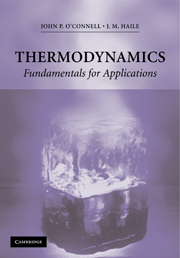Book contents
- Frontmatter
- Contents
- Preface
- Acknowledgments
- THERMODYNAMICS: Fundamental for Applications
- 0 Introduction
- PART I THE BASICS
- 1 Primitives
- 2 The First and Second Laws
- 3 Fundamental Relations
- PART II SINGLE-PHASE SYSTEMS
- PART III MULTIPHASE AND REACTING SYSTEMS
- PART IV ENGINEERING CALCULATIONS
- APPENDICES
- Notation
- Index
1 - Primitives
Published online by Cambridge University Press: 05 June 2012
- Frontmatter
- Contents
- Preface
- Acknowledgments
- THERMODYNAMICS: Fundamental for Applications
- 0 Introduction
- PART I THE BASICS
- 1 Primitives
- 2 The First and Second Laws
- 3 Fundamental Relations
- PART II SINGLE-PHASE SYSTEMS
- PART III MULTIPHASE AND REACTING SYSTEMS
- PART IV ENGINEERING CALCULATIONS
- APPENDICES
- Notation
- Index
Summary
In this chapter we review elementary concepts that are used to describe Nature. These concepts are so basic that we call them primitives, for everything in later chapters builds on these ideas. You have probably encountered this material before, but our presentation may be new to you. The chapter is divided into primitive things (§ 1.1), primitive quantities (§ 1.2), primitive changes (§ 1.3), and primitive analyses (§ 1.4).
PRIMITIVE THINGS
Every thermodynamic analysis focuses on a system—what you're talking about. The system occupies a definite region in space: it may be composed of one homogeneous phase or many disparate parts. When we start an analysis, we must properly and explicitly identify the system; otherwise, our analysis will be vague and perhaps misleading. In some situations there is only one correct identification of the system; in other situations, several correct choices are possible, but some may simplify an analysis more than others.
A system can be described at either of two levels: a macroscopic description pertains to a system sufficiently large to be perceived by human senses; a microscopic description pertains to individual molecules and how those molecules interact with one another. Thermodynamics applies to macroscopic entities; nevertheless, we will occasionally appeal to microscopic descriptions to interpret macroscopic phenomena. Both levels contain primitive things.
Macroscopic Things
Beyond the system lies the rest of the universe, which we call the surroundings. Actually, the surroundings include only that part of the universe close enough to affect the system in some way.
- Type
- Chapter
- Information
- ThermodynamicsFundamentals for Applications, pp. 10 - 31Publisher: Cambridge University PressPrint publication year: 2005



